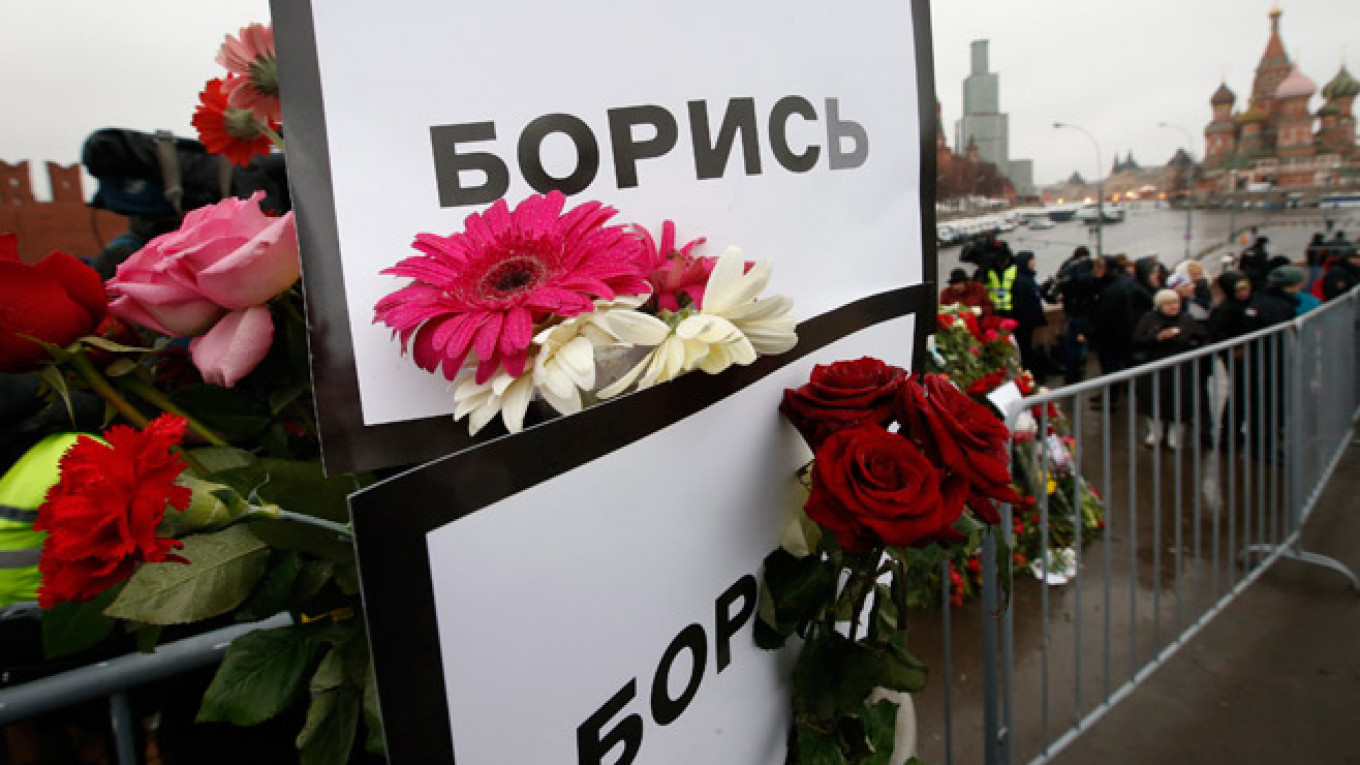Бори́сь!: Fight on!
After the assassination of Boris Nemtsov and the days of mourning and horror that followed it, it's hard to find my usual joy in the Russian language and its constant, fascinating evolution. Perhaps this is because its evolution is being slowed, or thrown back in places, by the re-emergence of Soviet-era words, phrases and concepts.
In the new category, we've got the word скрымзить — to steal, especially land or territory — derived from the word Крым (Crimea). I guess this is something like "to pull a Crimea": Кто ж откажется скрымзить кусок территории при случае. (Who would turn down the chance to pull a Crimea and grab a piece of land.)
Скрымзить is used in other contexts, too, as a modern replacement for скоммуниздить (to make off with something, the way communists expropriated private property). Когда начальник в командировке, его сотрудники стараются что-нибудь скрымзить. (When the boss is away on business, his employees try to rip off something.)
And in the revived old category, there's провокация (provocation), which is making such a comeback that it's shooting off the top of the Google Ngram chart. Провокация has several meanings. It can be simply the act of provoking or inciting someone to do something. For example, on the eve of Hitler's attack on the U.S.S.R., General Zhukov sent an order to the front lines: Задача наших войск — воздержаться от каких бы то ни было действий, которые можно истолковать как провокацию. (The task of our troops is to refrain from any action that might be perceived as a provocation.)
But провокация has another very special meaning in the Russian political lexicon: провокация is an act committed by one party to make it look like it was done by another party. For example, President Vladimir Putin's spokesman Dmitry Peskov said about Nemtsov's murder: Со стопроцентной уверенностью можно говорить о том, что это провокация (I can say with 100 percent certainty that it's a provocation). That is, Nemtsov was murdered by — pick your demon — the United States, Ukraine, or a fellow Russian oppositionist in order to make it look like someone in the Russian government did it.
And then there is провокация usage that I find so insane that I can't actually figure out what it means. Recently a deputy in the Federation Council said the horrific fire at the Institute for Scientific Information on Social Sciences "мог быть провокацией с целью исказить исторические факты" (might have been a provocation that had the goal of distorting historical facts). In what sense could a fire be a provocation? In what universe does that make any sense? I'll pass on that one.
Use of the phrase пятая колонна (the fifth column, i.e., a group that undermines a nation/army/structure from within) peaked during the Great Patriotic War. After decades of dormancy, usage has picked up. Now in some political circles, пятая колонна, предатель (traitor), and оппозиция (opposition) are synonyms.
Another word making a big come back is бороться (to fight, battle, struggle). Бороться is what the government is doing against those fifth columnists — fighting them down. And бороться is what the opposition is doing in response — resisting, fighting back.
The most touching sign at the march in memory of Boris Nemtsov was борись (fight on!), the imperative form of the verb бороться, which but for a soft sign is the name of the man people had come to honor and mourn — a small gift from the Russian language on a day of great sorrow.
Michele A. Berdy, a Moscow-based translator and interpreter, is author of "The Russian Word's Worth" (Glas), a collection of her columns.
A Message from The Moscow Times:
Dear readers,
We are facing unprecedented challenges. Russia's Prosecutor General's Office has designated The Moscow Times as an "undesirable" organization, criminalizing our work and putting our staff at risk of prosecution. This follows our earlier unjust labeling as a "foreign agent."
These actions are direct attempts to silence independent journalism in Russia. The authorities claim our work "discredits the decisions of the Russian leadership." We see things differently: we strive to provide accurate, unbiased reporting on Russia.
We, the journalists of The Moscow Times, refuse to be silenced. But to continue our work, we need your help.
Your support, no matter how small, makes a world of difference. If you can, please support us monthly starting from just $2. It's quick to set up, and every contribution makes a significant impact.
By supporting The Moscow Times, you're defending open, independent journalism in the face of repression. Thank you for standing with us.
Remind me later.








